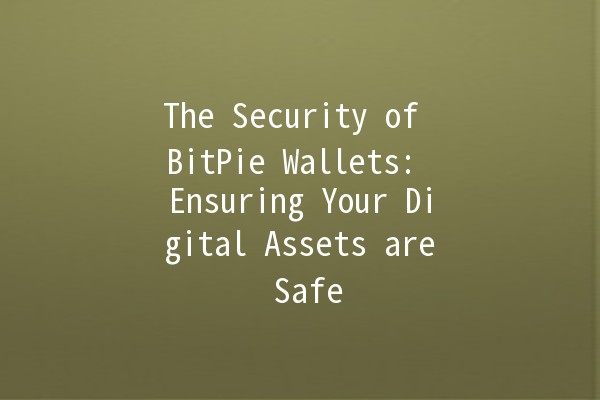
In recent years, cryptocurrency has gained immense popularity, with millions of users investing in various digital assets. As the market continues to expand, ensuring the security of those assets has become paramount. Among the various cryptocurrency wallets available today, BitPie Wallet stands out for its unique features and robust security measures. This article delves deep into the security aspects of BitPie Wallet and provides users with practical tips to enhance their asset protection.
Understanding BitPie Wallet
BitPie Wallet is a versatile cryptocurrency wallet that supports various digital currencies, including Bitcoin, Ethereum, and Litecoin, among others. Besides its multicurrency feature, BitPie is renowned for its userfriendly interface, making it accessible for both novice and experienced cryptocurrency enthusiasts.
Key Security Features
BitPie Wallet employs several security measures to safeguard users' assets:

Practical Tips to Enhance Your Asset Security
Even with builtin security measures, users must adopt additional practices to ensure the safety of their digital assets. Here are five effective tips to enhance your assets' security when using BitPie Wallet:
Explanation: Activate 2FA on your BitPie account to add an extra layer of protection. This requires you to enter a unique code sent to your mobile device or generated by an authentication app whenever you log in or perform transactions.
Example: After downloading a 2FA app like Google Authenticator, link it to your BitPie Wallet. Each time you log in, you'll require a onetime code, making it much harder for anyone else to access your account.
Explanation: Developers frequently release updates to fix vulnerabilities and improve security. Keeping your wallet app uptodate ensures you benefit from the latest security enhancements.
Example: Enable automatic updates on your mobile device, or periodically check the app store for new versions of the BitPie Wallet. Regular updates will help protect you from known exploits.
Explanation: A strong password is your first line of defense. Avoid using easily guessable passwords and ensure each of your online accounts has a unique password.
Example: Instead of using "password123," consider phrases that combine upper and lowercase letters, numbers, and symbols, such as "MyC0olBitP@ssw0rd!" This makes it significantly more challenging for attackers to access your account.
Explanation: Regular backups of your wallet can save your assets if there are device failures or losses. Make it a habit to back up your wallet every few weeks.
Example: If you create a seed phrase backup, write it down, and store it in a secure location, like a safe deposit box. Ensure you only share this phrase with trusted individuals, if necessary.
Explanation: Phishing attacks target unsuspecting users through fraudulent emails or websites that impersonate legitimate services. Always doublecheck URLs and emails before entering any sensitive information.
Example: If you receive an email claiming to be from BitPie support asking you to verify your account, verify the sender's email address and do not click on any links. Instead, go to the official BitPie website directly to check any notifications.
Common Security Questions About BitPie Wallet
Answer: Yes, BitPie Wallet is designed with userfriendliness in mind, making it suitable for both beginners and experienced users. It offers robust security features like private key control and 2FA, which help safeguard assets. Additionally, BitPie provides tutorials and resources for new users to navigate the wallet effectively.
Answer: If you lose your device, you can still access your BitPie Wallet using your seed phrase. As long as you have written down and securely stored your seed phrase, you can recover your wallet on a new device. Make sure to install the BitPie Wallet app, select the "recover wallet" option, and input your seed phrase to restore your assets.
Answer: Yes, BitPie Wallet allows users to view and manage their private keys. However, ensuring you store your keys safely is vital. Avoid sharing them with anyone, and never enter your private keys on websites or apps that you do not trust.
Answer: If you suspect that your wallet has been compromised, immediately change your password and enable 2FA if you haven’t done so already. If you can still access your wallet, transfer your funds to a new wallet. Regularly backing up your wallet ensures you can recover your assets in emergencies.
Answer: BitPie Wallet implements several security features to protect against fraud, including cold storage for funds, twofactor authentication, and multisignature options for transaction approval. Moreover, the wallet is continually updated to protect against emerging threats, ensuring a safe environment for users.
Answer: While BitPie Wallet offers solid security features, many users prefer using a hardware wallet for even greater security. Hardware wallets store private keys offline, which drastically reduces the risk of hacking. If handling significant amounts of cryptocurrency, consider using both BitPie Wallet for everyday transactions and a hardware wallet for longterm storage.
Enhancing Security: Staying Vigilant
The cryptocurrency landscape is constantly evolving, which necessitates users to remain vigilant about their security measures. By integrating robust practices alongside BitPie Wallet's builtin features, users can significantly enhance the safety of their assets. Embrace systematic security measures, stay informed about potential vulnerabilities, and be proactive in protecting your digital investments. With a commitment to security, you can confidently navigate the world of cryptocurrency, knowing your assets are effectively safeguarded.
Taking these steps will not only benefit your personal security but will also bolster the overall integrity of the cryptocurrency ecosystem. By sharing what you learn with fellow users, you contribute to a culture of awareness and safety within the community. Empower yourself and others in the realm of digital currency; your financial future deserves it.

